Industry Recognition and Demand for Information Security Certifications
Explore the industry recognition and high demand for information security certifications. Gain insights into advancing your career in cybersecurity.

The importance of information security has increased in modern times as online communication and commerce have grown faster. This expansion increases the possibility of cyberattacks, necessitating strict precautions to protect sensitive and personal data. To protect data confidentiality and minimize potential breaches, strong security processes are even more important in light of privacy concerns and regulatory compliance.
Information security is crucial for more than just safety as companies go digital; it's also necessary for maintaining trademarks and maintaining continuous operations. Flexibility is important in a constantly changing context, where new risks call for ongoing surveillance and preventative action. Information security is essential to our connected world's resilience and sense of trust.
Challenges for New Entrants in Attaining Information Security Certifications
-
Choosing the Right Certification:
There are many certifications in the information security space, including CISSP, CEH, and CompTIA Security+, so choosing the right one might be difficult for beginners. Every certification has its qualifications, specializations, and recognition in the business. It takes a lot of planning and investigation to choose which certification best fits one's interests, skill sets, and professional objectives.
-
Meeting Certification Criteria:
A lot of information security certifications include requirements that applicants must fulfill, such as a particular amount of work experience or educational background. Meeting these requirements can be quite difficult for those joining the industry with little to no prior experience or formal education in cybersecurity. To close the gap, it could be necessary to obtain appropriate experience through self-study, internships, or entry-level jobs.
-
Financial Barriers:
Obtaining certifications in information security is frequently a costly process. The cost of study materials, exam registration fees, and maybe training courses must be covered by candidates. These costs could be a deterrent for people with low incomes, particularly those who are changing careers or are students, from beginning the certification process.

- Dedicated Study Time:
Exam preparation for information security certifications necessitates thorough study. It can be difficult to balance academic commitments with other obligations like a job or schooling. It takes discipline and good time management to find time to study when handling conflicting demands.
-
Staying Updated:
Cybersecurity is a dynamic sector where new technology and dangers appear regularly. To succeed in certification examinations, candidates need to keep current on the latest developments, trends, and industry best practices. The certification procedure is made more difficult by this continuous learning process, which necessitates that candidates keep their knowledge and abilities up to date.
-
Overcoming Challenges:
With the correct resources, effort, and commitment, it is still possible to earn have information security certifications despite these obstacles. Information security newbies can lower their barriers to entry and navigate the certification process with the assistance of seasoned professionals, online courses, study materials, and practical experience gained through internships or projects.
How can organizations incentivize employees to pursue and obtain information security certifications?
-
Financial Support: Offering financial support, such as paying for study materials, exams, incentives, or pay raises upon certification achievement, can be a powerful motivator for staff members.
-
Training Opportunities: Offering study groups, workshops, or training courses to staff members that help in getting ready for certification examinations shows a company's dedication to their professional growth and may motivate them to seek certificates.
-
Career Advancement: Employees can be motivated to invest in their certification goals by making it clear how earning certificates can lead to chances for professional growth inside the company, such as promotions or access to higher-level responsibilities.
-
Recognition and Rewards: Fostering a culture that appreciates and promotes continual learning and performance is achieved by recognizing and celebrating employees who gain certificates through company-wide announcements, awards, or other kinds of approval.
-
Professional Development Plans: Employees can be given a clear path forward and motivation to pursue certification by working with them to create individualized professional development plans that include information security certification goals.
-
Mentorship and Support: Establishing relationships with mentors or giving staff members access to resources and support systems can help them stay motivated and goal-focused during the certification process by offering advice and assistance.
-
Integration with Job Roles: The practical significance of earning certificates can be illustrated by matching certification objectives with the duties and responsibilities of employees. This will further highlight how certifications support both individual and organizational achievement.
-
Creating a Positive Learning Environment: A culture of ongoing learning and professional development is fostered by creating a welcoming and supportive work environment where staff members can pursue certifications and receive the assistance and resources they need.
The Demand for Information Security
Growing Reliance on Digital Technologies:
-
Businesses and organizations depend increasingly on digital platforms and systems to store, process, and transfer enormous volumes of sensitive data as they digitize their operations. This data, which includes customer and financial details, is extremely valuable and has to be shielded against abuse and illegal access.
Awareness of Cyber Threats:
-
Cyber threats have sharply increased in recent years, affecting companies of all sizes and in all sectors. These dangers can take many different forms, such as advanced hacking attempts, malevolent actors orchestrating data breaches, and the dissemination of harmful malware. Organizations are now more aware of the possible dangers that these attacks on their data and operations may bring.
Expanded Attack Surface:
-
The potential attack surface for cybercriminals has increased dramatically due to the interconnectedness of modern systems and the continuous expansion of digital platforms. There are more access points for cyberattacks than ever before thanks to the growth of cloud services, mobile devices, Internet of Things (IoT) devices, and remote work situations. Strong information security procedures are important for protecting organizational assets because of this growing complexity.
Government Regulations and Industry Standards:
-
Governments and regulatory agencies worldwide have implemented strict data protection legislation and industry-specific standards in response to the growing threat posed by cybercrime. Organizations are required to employ extensive information security procedures to secure sensitive data and maintain compliance with regulations such as the GDPR in Europe and HIPAA in the healthcare industry. There are severe penalties and reputational harm associated with breaking these limitations.
Maintaining Trust and Reputation:
-
a company's capacity to maintain trust with its stakeholders, partners, and clients is critical to its success. A solitary security incident or information theft can have far-reaching effects, including financial losses, reputational damage, and a decline in trust. Organizations can show their stakeholders that they are committed to safeguarding confidential information and maintaining confidence by making important investments in information security solutions.
The growing significance of protecting sensitive data in our digital age is driving the need for information security certifications. The increasing dependence of businesses and organizations on digital technologies highlights the possible risks associated with cyber threats. A company's ability to comply with regulations, safeguard confidential data, and uphold stakeholder confidence are critical to its success. Employers may provide staff members with financial assistance, training possibilities, and opportunities for career advancement even in the face of obstacles experienced by recent graduates trying to obtain certificates. In the end, information security investments reduce risks, build resilience, and promote trust in modern society.
























